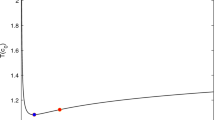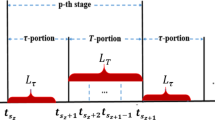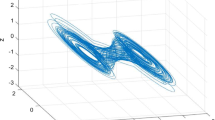Abstract
The adaptive dynamic programming (ADP)-based optimal regulation strategy is put forward for input-constrained nonlinear time-delay systems. In the spirit of Lyapunov theories, the stability of the nominal system is investigated in terms of linear matrix inequalities (LMIs), which consequently gives rise to sufficient delay-dependent stability conditions. Afterward, a single neural network (NN) which serves as critic and actor NN simultaneously is employed for the realization of ADP-based optimal regulation. The NN weights are updated in real-time and the weight estimate errors are proved to be convergent. As a result, computational complexity is efficiently decreased together with the storage space. Numerical simulation shows the validation of our approach.Kindly check and confirm the inserted city name is correct. Amend if necessary.CorrectKindly check and confirm the Organization division and Organization name of Affiliation 2.Correcy








Similar content being viewed by others
References
Angelov VG (1988) A converse to a contraction mapping theorem in uniform spaces. Nonlinear Anal Theory Methods Appl 12(10):989–996
Bensoussan A (1983) Maximum principle and dynamic programming approaches of the optimal control of partially observed diffusions. Stoch Int J Prob Stoch Process 9(3):169–222
Branicky MS, Borkar VS, Mitter SK (1998) A unified framework for hybrid control: model and optimal control theory. IEEE Trans Autom Control 43(1):31–45
Cao YY, Lin Z (2003) Stability analysis of discrete-time systems with actuator saturation by a saturation-dependent lyapunov function. Automatica 39(7):1235–1241
Chen M, Ge SS, Ren B (2011) Adaptive tracking control of uncertain mimo nonlinear systems with input constraints. Automatica 47(3):452–465
Gopalsamy K (1992) Stability and oscillations in delay differential equations of population dynamics. Springer, Netherlands
Gu K, Kharitonov V, Chen J (2003) Stability of time-delay systems. Bitkhäuser, Boston
Himmelberg C, Parthasarathy T, VanVleck F (1976) Optimal plans for dynamic programming problems. Math Op Res 1(4):390–394
Huang Y, Lu WM (1996) Nonlinear optimal control: Alternatives to Hamilton-Jacobi equation. In: Proceedings of 35th IEEE conference on decision and control, vol. 4, pp 3942–3947
Jia Q, Bram AK, Han Z(2021) Synchronization of drive-response networks with event-based pinning control. Neural Comp Appl (to appear)
Kamalapurkar R, Rosenfeld J, Dixon W (2016) Efficient model-based reinforcement learning for approximate online optimal control. Automatica 74:247–258
Kurtz MJ, Henson MA (1998) Feedback linearizing control of discrete-time nonlinear systems with input constraints. Int J Control 70(4):603–616
Li C, Huang T (2009) On the stability of nonlinear systems with leakage delay - sciencedirect. J Frankl Inst 346(4):366–377
Li Y (2000) Optimal guaranteed cost control of linear uncertain system: an LMI approach. Control Theory Appl 17(3):423–428
Liu D, Wei Q, Wang D, Yang X, Li H (2017) Value iteration ADP for discrete-time nonlinear systems. In: Advances in industrial control] Adaptive dynamic programming with applications in optimal control, pp 37–90. Springer
Liu D, Wei Q, Yang X, Li H, Wang D (2017) Adaptive dynamic programming with applications in optimal control. Springer, Berlin
Manousiouthakis V, Chmielewski DJ (2002) On constrained infinite-time nonlinear optimal control. Chem Eng Sci 57(1):105–114
Rodriguez-Guerrero L, Santos-Sanchez O, Mondie S (2016) A constructive approach for an optimal control applied to a class of nonlinear time delay systems. J Process Control 40:35–49
Ross IM, Karpenko M (2012) A review of pseudospectral optimal control: from theory to flight. Ann Rev Control 36(2):182–197
Saberi A, Lin Z, Teel AR (1996) Control of linear systems with saturating actuators. IEEE Trans Autom Control 41(3):368–378
Serban I, Sankar C, Pieper M, Pineau J, Bengio Y (2018) The Bottleneck simulator: a model-based deep reinforcement learning approach
Seuret A, Gouaisbaut F, Fridman E (2013) Stability of systems with fast-varying delay using improved wirtinger’s inequality. In: Proceedings of 52nd IEEE Conference on Decision and Control, pp 946–951
Shen J, Lam J (2021) On the algebraic riccati inequality arising in cone-preserving time-delay systems. Automatica (to appear)
Song R, Xiao W, Zhang H (2014) Adaptive dynamic programming for a class of complex-valued nonlinear systems. IEEE Trans Neural Netw Learn Syst 25(9):1733–1739
Vamvoudakis KG, Lewis FL (2010) Online actor-critic algorithm to solve the continuous-time infinite horizon optimal control problem. Automatica 46(5):878–888
Wei Q, Liu D, Liu D (2013) Numerical adaptive learning control scheme for discrete-time non-linear systems. IET Control Theory Appl 7(11):1472–1486
Wu Z, Li Q, Wu W, Zhao M (2020) Crowdsourcing model for energy efficiency retrofit and mixed-integer equilibrium analysis. IEEE Trans Ind Inf 16(7):4512–4524
Zhan C, Li B, Zhong X et al (2020) A model for collective behaviour propagation: a case study of video game industry. Neural Comput Appl 32(4):4507–4517
Zhan C, Wu F, Huang Z et al (2020) Analysis of collective action propagation with multiple recurrences. Neural Comput Appl 32(4):13491–13504
Zhu J, Hou Y, Li T (2019) Optimal control of nonlinear systems with time delays: an online adp perspective. IEEE Access 7:145574–145581
Zhu J, Qi T, Ma D, Chen J (2018) Limits of stability and stabilization of time-delay systems: a small gain approach. Springer, Berlin
Author information
Authors and Affiliations
Corresponding author
Ethics declarations
Conflict of interest
The authors declare that they have no conflict of interest.
Additional information
Publisher's Note
Springer Nature remains neutral with regard to jurisdictional claims in published maps and institutional affiliations.
This research was supported in part by the China Postdoctoral Science Foundation under Grant 2019T120427, in part by the Fundamental Research Funds for the Central Universities under Grant NS2020023, and in part by the Macao Young Scholars Program under Grant AM2020006.
Rights and permissions
About this article
Cite this article
Zhu, J., Zhang, P. & Hou, Y. Adaptive dynamic programming-based optimal regulation on input-constrained nonlinear time-delay systems. Neural Comput & Applic 33, 13039–13047 (2021). https://doi.org/10.1007/s00521-021-06000-y
Received:
Accepted:
Published:
Issue Date:
DOI: https://doi.org/10.1007/s00521-021-06000-y




